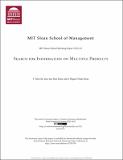Search for Information on Multiple Products
Author(s)
Ke, T. Tony; Shen, Zuo-Jun Max; Villas-Boas, J. Miguel
DownloadAccepted version (2.247Mb)
Terms of use
Metadata
Show full item recordAbstract
We develop a framework for continuous search for information on a choice set of multiple alternatives and apply it to consumer search in a product market. When a consumer considers purchasing a product in a product category, the consumer can gather information sequentially on several products. At each moment, the consumer can choose which product to gather more information on and whether to stop gathering information and purchase one of the products or to exit the market with no purchase. Given costly information gathering, consumers end up not gathering complete information on all the products and need to make decisions under imperfect information. Under the assumption of constant informativeness of search, we solve for the optimal search, switch, and purchase or exit behavior in such a setting, which is characterized by an optimal consideration set and a purchase threshold structure. This paper shows that a product is only considered for search or purchase if it has a sufficiently high expected utility. Given multiple products in the consumer's consideration set, the consumer only stops searching for information and purchases a product if the difference between the expected utilities of the top two products is greater than some threshold. Comparative statics show that negative information correlation among products widens the purchase threshold, and so does an increase in the number of the choices. Under our rational consumer model, we show that choice overload can occur when consumers search or evaluate multiple alternatives before making a purchase decision. We also find that it is optimal for a monopolistic seller of multiple products to facilitate information search for low-valuation consumers and obfuscate information for those with high valuations. Keywords: information; search theory; consideration set; Brownian motions; choice overload
Date issued
2016-12Department
Sloan School of ManagementJournal
Management Science
Publisher
Institute for Operations Research and the Management Sciences (INFORMS)
Citation
Ke, T. Tony et al. "Search for Information on Multiple Products." Management Science 62, 12 (February 2016): 3393-3672 © 2016 INFORMS
Version: Author's final manuscript
ISSN
0025-1909
1526-5501